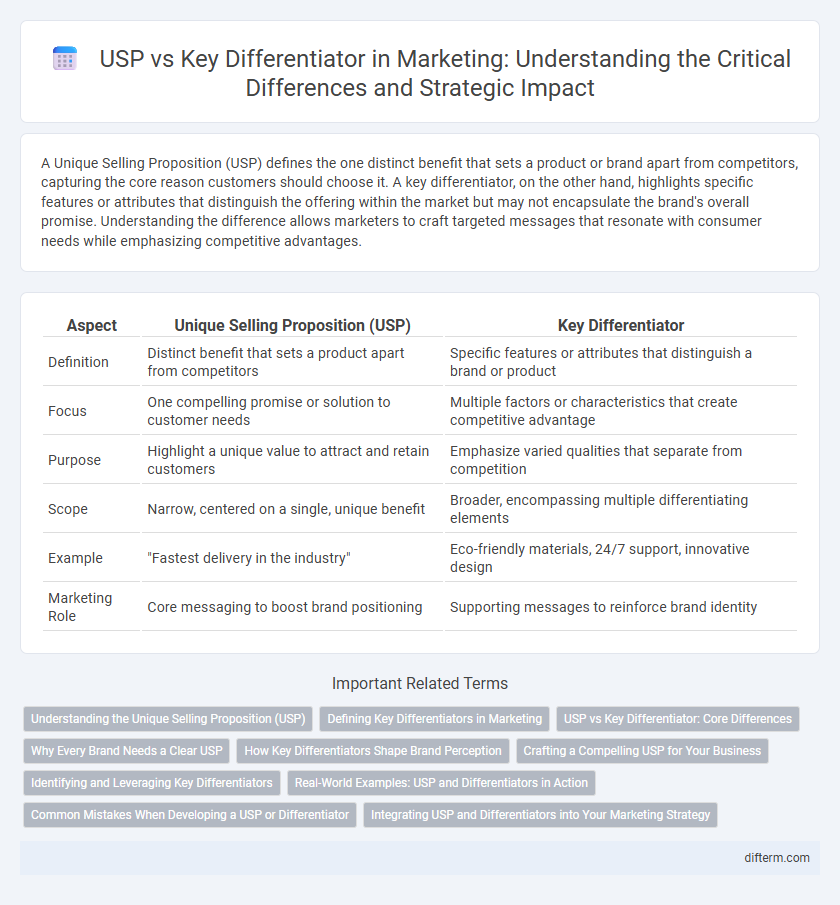A Unique Selling Proposition (USP) defines the one distinct benefit that sets a product or brand apart from competitors, capturing the core reason customers should choose it. A key differentiator, on the other hand, highlights specific features or attributes that distinguish the offering within the market but may not encapsulate the brand's overall promise. Understanding the difference allows marketers to craft targeted messages that resonate with consumer needs while emphasizing competitive advantages.
Table of Comparison
| Aspect | Unique Selling Proposition (USP) | Key Differentiator |
|---|---|---|
| Definition | Distinct benefit that sets a product apart from competitors | Specific features or attributes that distinguish a brand or product |
| Focus | One compelling promise or solution to customer needs | Multiple factors or characteristics that create competitive advantage |
| Purpose | Highlight a unique value to attract and retain customers | Emphasize varied qualities that separate from competition |
| Scope | Narrow, centered on a single, unique benefit | Broader, encompassing multiple differentiating elements |
| Example | "Fastest delivery in the industry" | Eco-friendly materials, 24/7 support, innovative design |
| Marketing Role | Core messaging to boost brand positioning | Supporting messages to reinforce brand identity |
Understanding the Unique Selling Proposition (USP)
The Unique Selling Proposition (USP) defines a brand's core promise that uniquely addresses customer needs, setting it apart from competitors by highlighting specific benefits and value. Unlike key differentiators, which are features or attributes distinguishing a product within the market, the USP communicates a compelling reason for consumers to choose the brand. Understanding the USP ensures targeted marketing strategies that resonate with a clearly defined audience through personalized messaging and distinct brand positioning.
Defining Key Differentiators in Marketing
Key differentiators in marketing are specific attributes or benefits that set a product or service apart from competitors, shaping consumer perception and driving purchase decisions. Unlike a unique selling proposition (USP), which emphasizes a singular, compelling promise, key differentiators highlight multiple facets such as quality, price, features, or customer service that collectively create competitive advantages. Identifying and communicating these distinct strengths helps brands establish a clear market position and foster customer loyalty.
USP vs Key Differentiator: Core Differences
A Unique Selling Proposition (USP) highlights the singular benefit that sets a product or service apart from competitors, emphasizing a compelling reason for customers to choose it. Key differentiators encompass multiple attributes or features that distinguish a brand but may not be as narrowly focused or customer-centric as a USP. The core difference lies in the USP's emphasis on one clear, persuasive advantage, whereas key differentiators provide broader points of distinction in the marketplace.
Why Every Brand Needs a Clear USP
A clear Unique Selling Proposition (USP) distinguishes a brand by highlighting its primary benefit that competitors do not offer, making it essential for capturing target audience attention. Unlike a key differentiator, which can be any distinguishing feature, the USP precisely communicates why customers should choose a specific brand. Brands with a strong USP experience higher customer loyalty, increased market share, and more effective marketing campaigns.
How Key Differentiators Shape Brand Perception
Key differentiators play a critical role in shaping brand perception by highlighting specific attributes that set a company apart from competitors. These attributes often influence customer preferences and enhance brand loyalty by clearly communicating what makes the brand unique beyond its unique selling proposition (USP). Consistent emphasis on key differentiators across marketing channels strengthens brand identity and increases perceived value in the marketplace.
Crafting a Compelling USP for Your Business
Crafting a compelling Unique Selling Proposition (USP) requires pinpointing the core benefit that sets your business apart from competitors by addressing customer needs in a way no other brand does. Unlike a key differentiator, which highlights distinct features or attributes, a USP conveys a clear, emotional promise that resonates deeply with your target audience. Businesses that effectively communicate their USP achieve stronger brand loyalty, higher conversion rates, and a more memorable market presence.
Identifying and Leveraging Key Differentiators
Key differentiators are specific attributes or benefits that set a product or service apart from competitors, driving customer preference and loyalty. Identifying these unique factors requires deep market analysis and understanding customer pain points to highlight advantages that resonate effectively. Leveraging key differentiators in marketing strategies amplifies brand positioning, making messages more targeted and compelling to the ideal audience.
Real-World Examples: USP and Differentiators in Action
Apple's Unique Selling Proposition (USP) centers on seamless user experience and premium design, setting it apart in the tech market. In contrast, Tesla's key differentiators include cutting-edge electric vehicle technology and autonomous driving capabilities. These real-world examples highlight how USPs define a brand's core promise, while differentiators emphasize specific features that distinguish products within competitive markets.
Common Mistakes When Developing a USP or Differentiator
Common mistakes when developing a Unique Selling Proposition (USP) or key differentiator often include confusing features with benefits, leading to unclear customer value. Overgeneralizing the USP dilutes brand identity and reduces competitive impact. Failing to align the USP with target customer needs results in ineffective marketing strategies and missed opportunities for differentiation.
Integrating USP and Differentiators into Your Marketing Strategy
Integrating your unique selling proposition (USP) and key differentiators into your marketing strategy amplifies brand clarity and competitive positioning. Highlighting specific features that resonate with target audiences and demonstrate clear value fosters stronger customer engagement and loyalty. Strategic communication of both elements ensures differentiation in saturated markets, driving measurable business growth and market share expansion.
Unique selling proposition (USP) vs key differentiator Infographic

 difterm.com
difterm.com